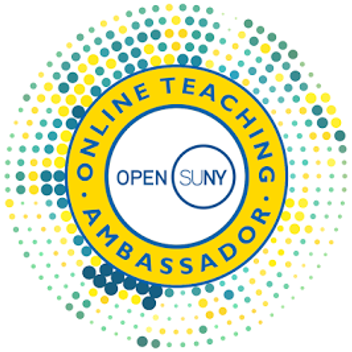Open SUNY Online Teaching Ambassador 2016 – Delhi: Tracey Caponera

Tracey Caponera holds a Master’s Degree in Service Management from Rochester Institute of Technology, and a Bachelor’s in Tourism Management from Niagara University. She is also certified in Hospitality Sales through Hospitality Sales and Marketing Association International.
She had an extensive 15-year career in hospitality operations and sales and marketing with Hyatt Hotels, Marriott, Sheraton as well as independent hotels and resorts prior to entering the academic field.
Tracey served for five years as a senior faculty member and director of internship programs at a leading hotel and culinary college in the Adirondacks and has been an Assistant Professor of Hospitality for SUNY Delhi for eight years, teaching strictly online for the past five years. She also is an adjunct instructor for Rochester Institute of Technology and Schenectady Community College in their Hospitality Departments. She served on the Educational Committee of the Northeast NY Chapter of Meeting Professionals International and the Advisory Board for New England Culinary Institute.
Her online teaching style is engaging and interactive and she strives to achieve learning objectives through the use of relevant and real life situations in her online courses. Tracey is a 3-time presenter at SUNY Plattsburgh’s Center for Excellence in Teaching Conferences, a 2-time presenter at SUNY Delhi’s Sharing Teaching Idea Days, and has been a presenter at SUNY Delhi’s Moodle annual conference. She will be presenting this June in Chicago at the Center for Advancement of Foodservice Education annual conference.
While online learning can offer convenience and flexibility to students, I firmly believe it should be equivalent to the rigor and engagement levels of an in-person collegiate course. I strive to closely match all learning objective with hands-on and interesting assignments that allow students to gain not only knowledge but also critical thinking skills. It is to the benefit of the student to take them “away” from the computer in online courses and keep them involved in relevant and real life situations. Doing so allows for the possibility of immediate application of knowledge, thereby increasing the retention of concepts and skills learned in an online course.
It is my practice to create as much structure and consistency as possible in the formatting of an online course. Providing multiple resources and examples, as well as detailed instructions and “lectures” assist students greatly in grasping concepts and completing assignments. Response time to online students is also crucial to their success and it provides opportunities for additional teachable moments that can happen even outside online discussion forums.
Making both value and purpose of assignments clear is vital to student engagement. Students must see how the topics or assignments can be useful to them now or in their future careers. It is important to take extra steps to ensure that clarity of purpose is in each assignment. It is also critical to ensure that learning is taking place in an online course by utilizing multiple methods of assessment. Since we cannot see “dazed or confused” looks on the faces of online students like we could in an in-person class, checking for learning regularly and from multiple angles will keep students committed to their own learning.
Lastly, the encouragement of interaction between not only student and faculty but also students with one another will help to avoid a sense of isolation in an online class. Promoting student interaction is also an excellent way to broaden perspectives, challenge student ideas and beliefs, and contribute to a true learning environment.















































